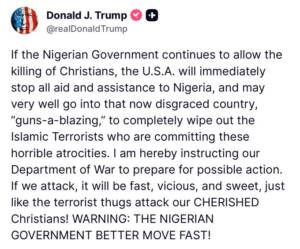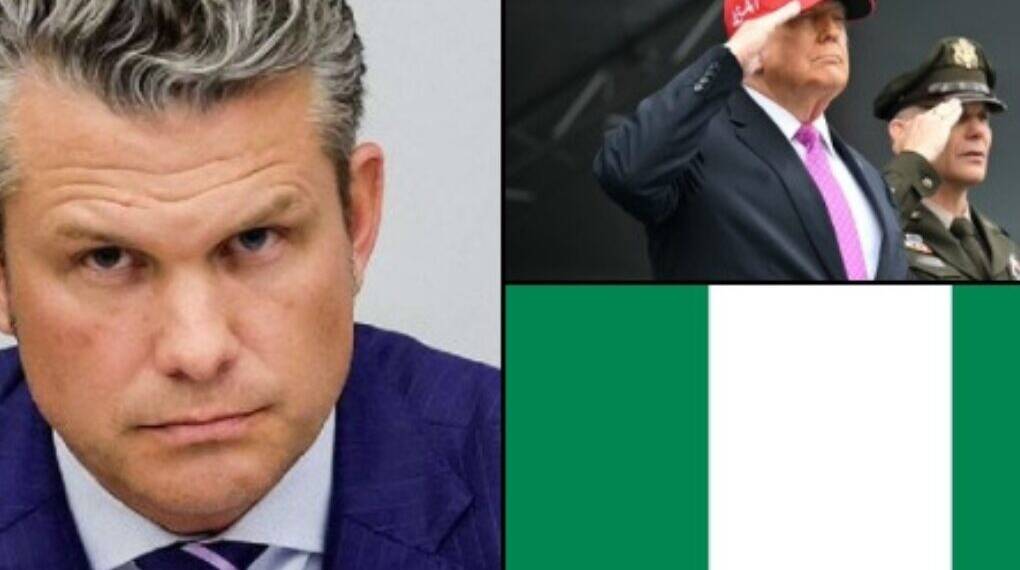In a dramatic escalation of rhetoric, U.S. President Donald Trump and his Secretary of War, Pete Hegseth, have announced that the United States is preparing for potential military action in Nigeria. The move, officials say, comes after a series of brutal attacks allegedly targeting Christian communities in northern and central parts of the country.
Hegseth, in a televised statement, declared that the “Department of War is preparing for action” following the President’s directive. He emphasized that the United States “will not stand by while innocent Christians are slaughtered,” warning the Nigerian government to act decisively or face U.S. intervention. Trump echoed the sentiment, threatening to suspend aid to Nigeria if the violence continues unchecked.

Nigeria Pushes Back
Nigerian President Bola Ahmed Tinubu responded firmly, rejecting Washington’s accusations and defending his government’s commitment to protecting all citizens regardless of religion. Tinubu stated that Nigeria remains a secular nation with deep respect for religious freedom and dismissed Trump’s remarks as “misguided and politically motivated.”
According to Nigerian officials, the violence in the country is not primarily religious but rather a complex mix of ethnic, territorial, and resource-related conflicts. They argue that framing the crisis as a one-sided religious war ignores the broader security and economic realities driving instability.
Tinubu’s government further accused the United States of attempting to “internationalize” Nigeria’s internal challenges and warned that any foreign military intervention would be seen as a violation of its sovereignty.
A Complex Conflict
For over a decade, Nigeria has battled multiple insurgent and extremist groups, including Boko Haram and the Islamic State’s West Africa Province (ISWAP). These organizations have carried out numerous attacks on both Muslim and Christian communities, displacing millions and destabilizing large parts of the north.
At the same time, inter-communal violence between herders and farmers, driven by land scarcity, climate change, and economic hardship, has deepened divisions. Many of these conflicts have been misrepresented as purely religious, though analysts note that both Christians and Muslims have suffered heavy losses.
The renewed U.S. rhetoric, however, risks inflaming this delicate balance. Nigerian analysts warn that foreign military involvement could fuel nationalist anger, strengthen extremist recruitment, and complicate ongoing peace and counterterrorism operations.
Washington’s Strategic Calculus
For Trump, the Nigerian situation fits into his administration’s broader theme of “protecting global Christianity” and reasserting American strength abroad. His statements also appeal to his conservative base ahead of a possible re-election bid, positioning him as a defender of faith and global security.
However, the Pentagon faces significant logistical and diplomatic hurdles. Nigeria is a large, densely populated country with multiple active insurgent fronts. Any unilateral military operation would require regional coordination and legal authorization, both of which appear unlikely without Abuja’s consent.
Furthermore, direct U.S. involvement could strain relations with African partners and fuel perceptions of neo-interventionism — a stance many African leaders have grown increasingly wary of in recent years.
Diplomatic Options and Risks
Despite the harsh tone from Washington, diplomatic backchannels remain open. U.S. officials have reportedly discussed expanding intelligence-sharing and counterterrorism cooperation with Nigerian forces. Humanitarian organizations are urging both governments to prioritize civilian protection and address root causes such as poverty, land scarcity, and corruption.
If Washington proceeds with military action or sanctions, it could reshape U.S.-Africa relations for years to come. Supporters argue it would deter extremist violence and signal a strong moral stance. Critics warn it risks destabilizing one of Africa’s largest democracies and alienating millions of Nigerians who view U.S. actions as interference.
The Road Ahead
While tensions are rising, most observers believe a full-scale U.S. intervention remains unlikely. More probable is a combination of aid pressure, expanded intelligence cooperation, and targeted drone surveillance — steps that allow Washington to project strength without confrontation.
For Nigeria, the priority remains restoring security while preserving its sovereignty. The Tinubu administration continues to balance internal military campaigns against insurgents with diplomatic efforts to attract foreign investment and development aid.
Yet the crisis highlights a growing global trend — where local conflicts are increasingly shaped by global narratives of religion, ideology, and power. As Washington and Abuja navigate this fraught chapter, the stakes extend far beyond Nigeria’s borders, testing the limits of diplomacy, faith, and geopolitics in a world on edge.







